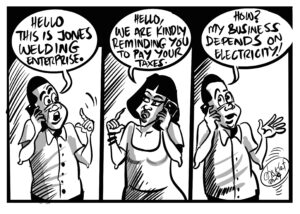Information Minister Dora Siliya says Zambians should not panic because there is nowhere in the Internet Regulation Bill where it states that government intends to close down social media platforms in Zambia but the bill only emphasises responsible use of electronic platforms.
And Siliya says UPND members should consider changing their leadership because the current one is taking them no where by being stuck on the 2016 elections.
Meanwhile, Siliya says Times of Zambia is bankrupt and tough decisions, like laying off staff, will be made going forward.
Speaking during her weekly media briefing, Monday, Siliya said the three proposed Internet regulation bills would ensure and guarantee safety and defence from cyber-attacks as well as minimise vulnerabilities.
She noted that cyber bullying was becoming common in Zambia hence the need to regulate the use of internet.
“Zambia maintains an open ICT sector market. We are however alive to the fact that opening up of the ICT sector brings to the fore, certain regulatory challenges that the Ministry of Transport nad Communications are constantly required to deal with in order to protect the carious consumers of ICT services across the country. The government through the Ministry of Transport and Communications is also engaged in reviewing the Electronic Communications and Transactions Act No.21 of 2009 and developing enhanced provisions through three bills to combat cybercrime and provide for a robust framework to govern cyber security and provide for enhanced data protection to all users of electronic platforms,” Siliya said.
“The Ministry of Transport and Communications (MTC) has proposed to sponsor three Bills in parliament that will repeal and replace the Electronic Communications and Transactions (ECT) Act No. 21 of 2009. The three Bills are; (i) Cyber Security and Cybercrimes Bill of 2018, (ii) Data Protection Bill, and (iii) Electronic Commerce and Transactions Bill of 2018…Nowhere in the bill is government intending to close social media platforms in Zambia, but emphasises responsible use of electronic platforms. Some of the notable effects of the enactment of the bills include; the creation of a Zambia Cyber Security Agency which will ensure and guarantee safety and defence from cyber-attacks and minimise vulnerability; the protection of Zambia’s critical infrastructure from numerous threats will ensure continuous economic development of the country; improved responsibility use of the available electronic platforms by the business community and the general citizenry; and increased cyber security posture.”
And Siliya asked UPND members to consider changing their leadership to a more progressive one.
“I think Zambia is made up of 16 million Zambians and these are very eager to see the country move forward…all well meaning Zambians want to look at issues of civility and tolerance in politics, they want to ensure that as we go forward, we continue to use a platform which we created ourselves, ZCID. I think that well meaning Zambians, in fact, I think that even those who belong to the UPND as members would like to see this country moving forward and not be stuck in 2016 elections, because the rest of us are in 2018. I think that there is a separation between the UPND leadership and the UPND members because I am convinced that the UPND members, who are just Zambians like all of us, they want to move forward and maybe it is time, instead of us as Zambians questioning ourselves, maybe its the UPND that need to question its leadership, that where do they want to take the party? Because for the rest of us as a country, we are very clear where we want to go, we don’t want imaginary problems in our country” Siliya said.
“For me, I don’t think that the UPND leadership should not deter the rest of the country because the rest of the country has moved on while the UPND leadership is stuck in 2016. I think even the members of UPND have moved on and they will do well to look for new leadership that can move them forward because if the leadership is stuck, then it is not serving you.”
Meanwhile, Siliya reiterated that Times of Zambia, whose employees declared a strike yesterday owing to none payment of nine-months salary arrears, was bankrupt.
“I cannot sugar coat it for you, Times of Zambia is in a bad situation. In fact, at this point, it is actually bankrupt. I think that what the IDC are trying to do is to see how to resolve this situation. One, it is over staffed, two it is under circulation and it means that if it is over staffed and under circulation, where is the money going to come from to support staff? So tough decisions have to be made including letting go of staff, including reorganization of the business model. As long as the business model is not coming, there is no way you are going to find money to pay the staff,” Siliya said.
On the Access to Information Bill, Siliya said government was hesitant to table it because it wanted to enhance regulations on how to access this information as well as tighten it to suit technological advancement.
“If a journalist is going to sit down on a computer and fabricate a story and publish it in a newspaper, are we going to say that journalist is entitled to access to information?…government has been very clear, come up with self regulation to show tat you value this job and when you do, then government will work with you on issues that we are already working with, with citizens on the Access to Information Bill. Because of technology, we have to relook at the Access to Information Bill because now, it is not just journalists who have the preserve of publishing it is anyone sitting anywhere who can take a phone and publish on WhatsApp and on Facebook so how do we regulate?” asked Siliya.
Siliya also revealed that in collaboration with the Chinese government, Zambia would soon embark on a Village TV programme which will benefit over 10,000 villages across the African Continent and 500 Villages in Zambia.












